PHOTO
HONG KONG: Asian shares extended gains on Wednesday, continuing a global relief rally as markets found positive news in early reports about the potential impact of the Omicron variant, although overnight advances in oil prices began to peter out.
"Markets are very sensitive to any slight new item relating to Omicron, and the absence of bad news is being taken very positively by equity markets, though - and I'm not a scientist - it seems too early to signal an all clear," said Stefan Hofer, chief investment strategist for private bank LGT in Asia Pacific
"With each new variant, we go through a period of waiting for some signal from the scientific community, which is difficult for markets, but that's what we got yesterday."
MSCI's broadest index of Asia-Pacific shares outside Japan rose 0.3% and Japan's Nikkei rose 1%. U.S. S&P 500 futures rose 0.25%.
British drugmaker GSK said on Tuesday its antibody-based COVID-19 therapy with U.S. partner Vir Biotechnology is effective against all mutations of the new Omicron coronavirus variant.
Also a South African study on Tuesday suggested that booster doses of the COVID-19 vaccine produced by Pfizer Inc and partner BioNTech's could help to fend off infection from Omicron, even though the study showed the new strain can partially evade the protection from two vaccine doses.
Those reports helped MSCI's all-country world index to close 2.1% higher on Tuesday, in its biggest percentage gain since November 2020. Oil also rose over 3%.
Markets are also focused on U.S. CPI data due Friday, with a high print likely to point policy makers towards accelerating the tapering of the Federal Reserve's massive bond buying programme which has put a floor under equity prices since the start of the pandemic.
"The relief rally could be quite shortlived if U.S. data on Friday shows high inflation is looking sticky, or persistent," - pick a word that isn't transitory," said Hofer.
Last week Fed Chair Jerome Powell said it might be time to stop seeing inflation as transitory and hinted the Fed might speed up tapering.
That ought to support the dollar, particularly against other currencies with more dovish central banks.
On Wednesday the greenback was little changed against a basket of six major peers, although the Australian dollar extended its overnight gains to $0.7122, its highest in a week, having fallen to a 13-month low due to worries about Omicron and a comparatively dovish central bank FRX
Better news and rising commodity prices helped the Aussie, while the rebound in oil prices helped the Canadian dollar to rise into a Bank of Canada policy meet later Wednesday.
All 29 economists polled by Reuters expect the Bank of Canada to keep rates unchanged at 0.25% at the meeting.
The benchmark U.S. 10-year Treasury yield edged a little lower on Wednesday, but after two days of gains on better news about Omicron.
It was last at 1.4614%, well up from Friday's recent low of 1.335% when Omicron worries first hit, but also well short of its pre-Omicron recent high in late November of 1.693%.
The two-year yield, which rises with expectations of higher interest rates, was at 0.6892% just shy of its recent top.
U.S. crude dipped 0.45% to $71.79 a barrel. Brent crude LCOc1 fell 0.44% to $75.11 per barrel.
Spot gold rose 0.3% to $1,789 an ounce, within its recent range, and rival inflation hedge, bitcoin was also calm after an exciting weekend, barely changed at $50,600.
(Reporting by Alun John, editing by Richard Pullin) ((alun.john@thomsonreuters.com;))
((To read Reuters Markets and Finance news, click on https://www.reuters.com/finance/markets For the state of play of Asian stock markets please click on: 0#.INDEXA ))





















